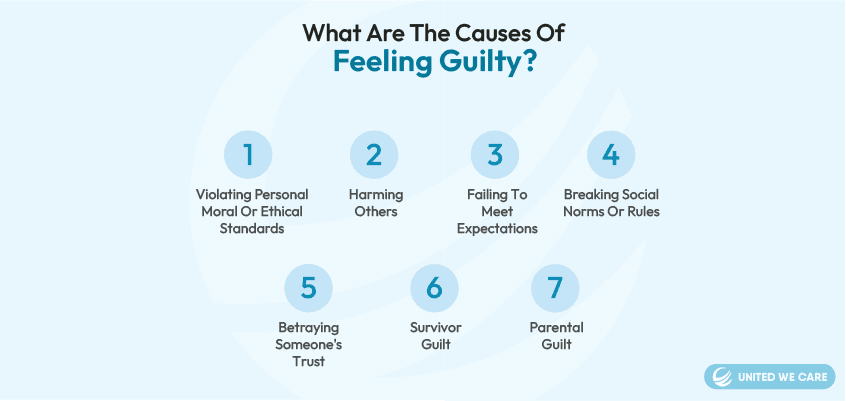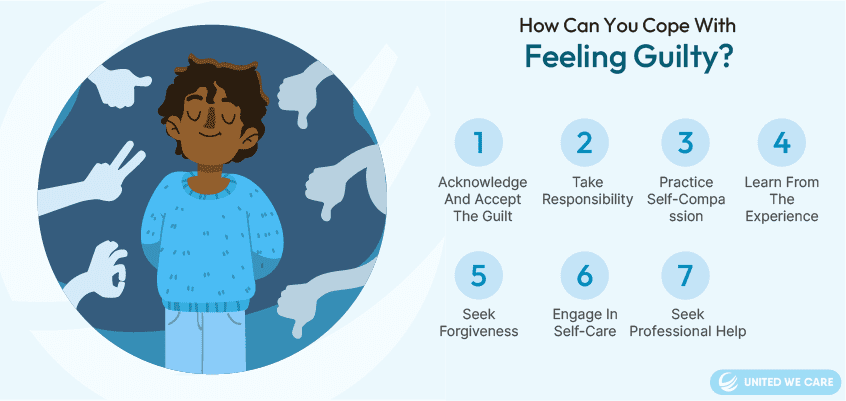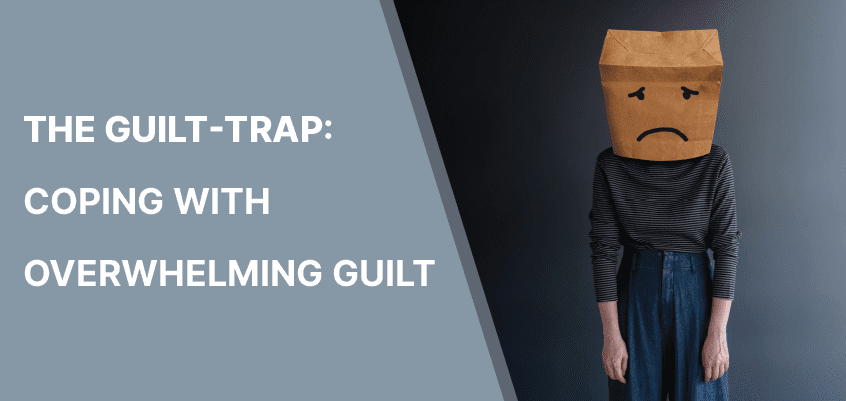Introduction
Do you feel sorry about certain situations in life that you could have dealt with in a better manner? We all feel guilty at some point in our lives. There are certain situations we all go through that may not have gone so badly if we had dealt with them in a different manner. That is what puts us in “The Guilt Trap.” In the article, let’s together explore what feeling guilt actually means, how it can affect you, and how you can cope with this feeling.
“There are two kinds of guilt: the kind that drowns you until you’re useless, and the kind that fires your soul to purpose.” – Sabaa Tahir [1]
What Does Feeling Guilty Mean?
Guilt is a common emotion. We all have felt guilty at some time in our lives. It is an emotion where we feel that we have done something wrong or that we could have done something better to make sure the situation does not go from bad to worse. These situations can be really minor or huge. These thoughts can make you feel really uncomfortable [2].
When we experience guilt, we mostly feel it in our stomach. It can be defined as a deep feeling of remorse about your actions or inactions. You might feel like you need to punish yourself or ask for punishment from others.
Guilt can act as a motivation, but it can also lead to self-doubt, low self-worth, and anxiety. However, if you are able to forgive yourself and get forgiven, you can make a positive change in our and other people’s lives.
Read more about -Feeling Guilty all the time
What are the Causes of Feeling Guilty?
There can be many factors that can add to us feeling guilty [3]:

- Violating Personal Moral Or Ethical Standards: When you go through an event where you have to go against your morals or principles, you might end up feeling guilty. For example, in the epic Mahabharata, Bheem felt guilty for going against the rules of the mace fight while battling against Duryodhana. The guilt was about breaking a personal moral for Bheem.
- Harming Others: You might feel guilty if you caused some harm to another person. It might be intentional or unintentional. For example, let’s say you had a few drinks and were returning back home thinking that there would be no one on the road. And, if you get into an accident and the other person gets severely injured or dies, you might get into the guilt trap.
- Failing To Meet Expectations: So, let’s say, after a certain age, your parents might expect you to contribute to the house and family. If you are not able to meet those expectations, you might feel guilty about it.
- Breaking Social Norms Or Rules: Just to give you an example, smoking, and drinking alcohol might be things that go against the rules and norms of a particular society. So if you indulge in smoking or drinking, you might feel guilty.
- Betraying Someone’s Trust: If by chance you broke someone’s trust, then you can also get into guilt. For example, your friend trusted you with details about her family, and you told all the other people in the group about it.
- Survivor Guilt: If you have survived a traumatic event in your life and others around you did not, you might feel guilty for surviving. For example, a lot of war veterans feel guilty for surviving the war, whereas their best friends do not. The guilt can get deeper if the friend has family members who are dependent on the friend.
- Parental Guilt: Parents may forever feel guilty for not being able to provide for their kids. For example, maybe your kid is unwell, and you have to go to work because of an important meeting. Choosing between your kid and your work can make you feel really guilty.
What Are The Effects Of Feeling Guilty?
If you feel guilty, then it can affect your mental, emotional, and physical health [4] [5]:
- You may feel stressed and anxious, specifically about the consequences of your actions on you and others.
- You might feel symptoms of depression, specifically if you cannot undo the situation you’re in. You may even avoid things that you usually enjoy.
- You might start feeling awful about the situation at hand, which can impact your sense of self-worth. You might feel you don’t deserve anything good.
- You might find it hard to make decisions because you might be worried that you’re going to make a mistake again.
- You might find it difficult to trust yourself around people or feel that you don’t deserve the love and support you’re getting. It can also be that you are unable to trust people.
- You might indulge in self-harming behavior where you could deliberately do things that can harm you, like cutting yourself.
How Do You Cope With Feeling Guilty?
You might feel that if you make a mistake, there’s no going back and that you must live with this guilt. But, there are a few strategies that can help you cope better with these feelings of guilt [6] [7]:

- Acknowledge And Accept The Guilt: The first thing you need to do is that you made a mistake and that you are feeling guilty. If you refuse to accept the mistake, then it’s possible that these feelings can erupt like a volcano at some point where it might be difficult for you to manage them. For example, in the movie ‘My Best Friend’s Wedding,’ Julliane forever felt guilty for not telling her best friend that she loved him. And when she did, she almost got his engagement broken. That added further to her guilt.
- Take Responsibility: Everyone makes mistakes. We are human, after all. So, if you have made a mistake or done something you probably should not have, take responsibility and try to make things right. For example, I once made a mistake at my workplace. But I took responsibility and tried to make everything right in as little time as possible.
- Practice Self-Compassion: When we do something wrong, one thing we do is that we keep beating ourselves up about it. So, it’s important to practice kindness and compassion toward yourself. If you forgive yourself first, then only you can really make things right properly and ask for forgiveness from others. If you are willing to rectify the situation or take responsibility, then you are not what you did; remember that.
- Practice Self-Compassion: When we do something wrong, one thing we do is that we keep beating ourselves up about it. So, it’s important to practice kindness and compassion toward yourself. If you forgive yourself first, then only you can really make things right properly and ask for forgiveness from others. If you are willing to rectify the situation or take responsibility, then you are not what you did; remember that.
- Learn From The Experience: My grandmother always used to say that if you make a mistake, either you don’t do anything about it or you learn what not to do. So, whatever mistake you did, learn from it and grow from it. That way, you can try not to repeat the same mistake and make better choices in the future.
- Seek Forgiveness: As I said, if you have forgiven yourself, you can ask for forgiveness from the people who have gotten hurt because of your mistakes, if that is possible. That way, you can get rid of the guilt and work on building a better relationship.
- Engage In Self-Care: You must make sure that in order to right the wrongs, you start ignoring yourself. I would suggest that you indulge in some form of self-care, like exercising, meditating, spending time with loved ones, etc.
- Seek Professional Help: There can come a time when you are unable to manage your feelings of guilt. In such a situation, you can get help from a psychologist or counselor. You don’t have to handle everything on your own. These professionals can help you cope better and help you understand why the mistake is leading to such high guilt levels.
Conclusion
We all feel guilty at some point in our lives. However, sometimes, these feelings of guilt can make us freeze in time. Even though days and years could be passing, mentally, we might be stuck in a situation where we made a mistake. Whether you did something intentionally or unintentionally, if you are feeling guilty, then that means that you regret what you did or didn’t do. So accept that and try moving forward. Begin by forgiving yourself and then try solving the situation if you can so that you can lead a more meaningful life.
If you are feeling guilty and looking for solutions, you can reach out to our expert counselors or explore more content at United We Care! At United We Care, a team of wellness and mental health experts will guide you with the best methods for well-being.
References
[1] “A quote from An Ember in the Ashes.” https://www.goodreads.com/quotes/6644111-there-are-two-kinds-of-guilt-the-kind-that-drowns#:~:text=There%20are%20two%20kinds%20of%20guilt%3A%20the%20kind%20that%20drowns,fires%20your%20soul%20to%20purpose
[2] “Therapy for Guilt,” Therapy for Guilt, Sep. 15, 2009. https://www.goodtherapy.org/learn-about-therapy/issues/guilt
[3] “Survivor Guilt: Symptoms, Causes, Coping Tips, and More,” Survivor Guilt: Symptoms, Causes, Coping Tips, and More. https://www.healthline.com/health/mental-health/survivors-guilt
[4] “Self-Distancing: Theory, Research, and Current Directions,” Self-Distancing: Theory, Research, and Current Directions – ScienceDirect, Dec. 28, 2016. https://www.sciencedirect.com/science/article/abs/pii/S0065260116300338
[5] “Guilt,” Psychology Today, Mar. 01, 2023. https://www.psychologytoday.com/us/basics/guilt
[6] “https://www.apa.org/topics/forgiveness.” https://www.apa.org/topics/forgiveness
[7] “Therapy for Guilt,” Therapy for Guilt, Sep. 15, 2009. https://www.goodtherapy.org/learn-about-therapy/issues/guilt/treatment










